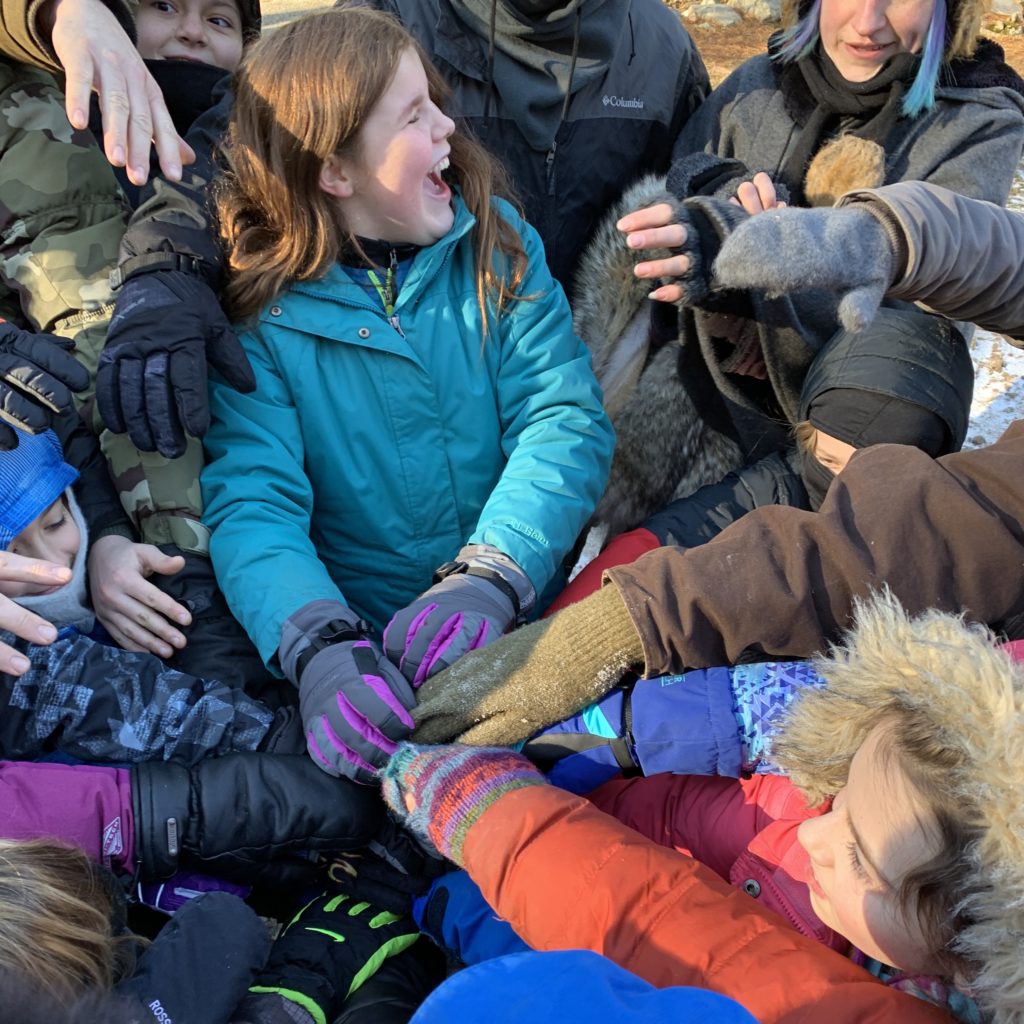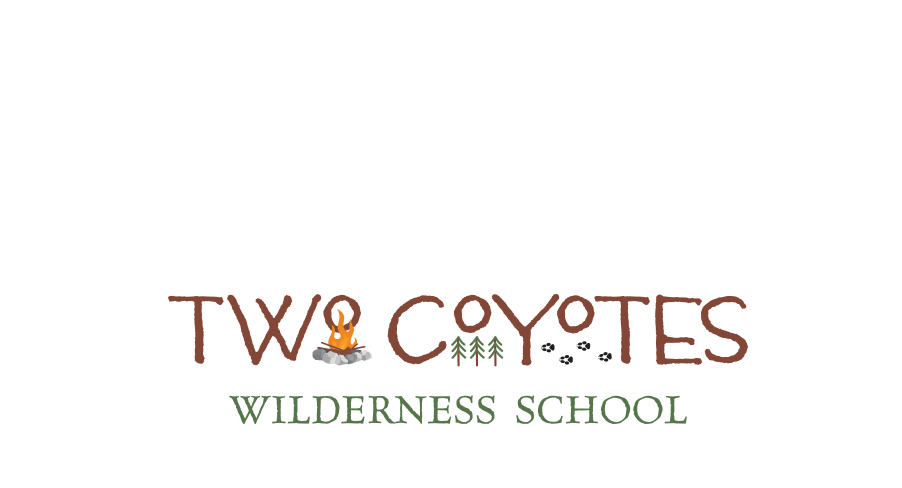Use your outside voice!
We’ve shared what you can expect from us throughout the website and are always happy to answer your questions. We thrive on the stories and experiences of people of all ages in our programs. In order for a child to be safe and successful and get the most out of their time with Two Coyotes, there are some expectations that help us create the amazing experiences families grow to love.
In addition to what is listed below, we require that all children at Two Coyotes are able to stay with the group as instructed. We do allow and encourage child-led wandering, within established boundaries, however children who leave without telling an instructor or run off when scared, embarrassed, frustrated, angry, homesick, or bored endanger themselves and others. We cannot allow children to remain in or return to our program if they are not able to follow this crucial safety rule.
If anything listed on this page seems like a stretch or a new skill for your child and they may need a special accommodation, please contact benjamin@twocoyotes.org before you enroll. This must be at least one month before the program starts so that together we can plan the best approach for your child. This info is shared directly with your child’s mentor and we ask that you also speak with your child’s nature mentor if something new emerges during a program season.
For everyone’s safety, we have the following expectations for our programs (organized by age group):
Coyote Pups
Caregivers are actively engaged with monitoring child’s safety at all times – We welcome child-led exploration in our programs, and with our little ones we require that caregivers are responsible for their child as they explore near a pond, a fire, or a cliff…
Caregivers are hands-on in supporting their child’s experience – Coyote Pups is for the adult caregiver as much as it is for the infant or toddler. Children learn by watching the adults in their lives model participating in the activity, as well as respectful listening, participation in circles, love for the land, compassion and curiosity for differences.
Ages 5+ (drop-off programs)
Not cause repeated harm to others – We all learn from making mistakes, and we expect that with support from their mentors, all children in our programs will respect the physical and emotional safety of others.
Use the bathroom by themselves – Everybody poops. 🙂 Some of our locations do not have indoor plumbing so we teach the very real survival skill of “going in the woods.” Kids need to be willing to learn how to do this on their own whether in a porta-potty or behind a tree, and be able to aim, wipe, and bury their treasures with our instruction but not our hands-on help. Of course, we are there for accidents but for the safety of everyone, kids need to be willing to embrace this skill.
Be away from a parent or caregiver – We know for some this is their first time being in a drop-off program and we’re honored you chose us! We ask that you speak with your child ahead of time so they are prepared and willing to have a great, independent day with our caring staff.
Carry their gear all day – When you register you get a detailed packing list. We recommend a backpack filled with various gear to be successful out in the woods all day. Kids need to have their bags packed in a way that enables them to carry what they need with minimal assistance from a mentor or a friend. Please do a test run at home before the first day of a program.
Use developmentally appropriate communication skills – Something awesome happen? We want to hear about it! Something challenging going on between you and someone else, or within yourself? We want to hear that too! We aim to gain the trust of the children and hope they will share with us their questions, concerns, and gems. We often have talking circles and teach and model clear ways of communicating needs and boundaries with each other, so being willing and able to share is a valuable and important piece to creating a safe container for everyone.
Ages 8+
Everything listed under the previous age group, as well as:
Listen to and follow directions – This is something we are actively developing in the younger children in our programs, as it is the most important element for our programs to be meaningful and fun when we are together as a group in beautiful, wild spaces. Participants age 8+ need to be able and willing to follow our instructions at all times without dedicated, 1:1 attention from our staff who must be available to everyone. We create a Code of Conduct with the children at the beginning of the session to create ownership and community right from the start!
Be open, accepting of others, and respectful of one’s self as well as others’ perspectives, cultures, and backgrounds.
Speak for their feelings, rather than from them – We don’t expect any child to do this perfectly every time (this can be challenging at any age!) but we do expect that when a child is experiencing a big emotion like anger, frustration, or sadness, they are able, more often than not, to communicate those feelings without causing harm to others. For example, we might say, “It’s ok to feel mad, but it’s not ok to say mean things to your friend (or to hit, shut down, or run away).”
Respond well to a mentor checking in on their physical or emotional well-being – When flooded with big emotions, a child may need to pause and ground themselves before rejoining the group. Our mentors will keep an eye on the child while allowing them their space as needed. We expect that when one of our mentors checks in (whether verbally or nonverbally) with a child who is dysregulated, the child is able to respond without causing harm to others (e.g. hitting, shutting down, or running away, as mentioned above).
Respond well to a mentor’s redirection or course-correcting – We encourage children of all ages to try on new experiences at Two Coyotes. For the most part, our mentors allow natural consequences to be the teacher in our programs, unless it affects the physical or emotional safety of an individual or the group. When a mentor sets a boundary or redirects a child’s behavior, we expect the child to receive that openly and do their best to adjust accordingly. Mentors will communicate with parents at pick-up or will call home from the field if the child is not adjusting their behavior or if the issue is escalating. Together mentors and parents will work together to identify strategies that will support the child’s needs and uphold the safety of the group.
Wants to be at Two Coyotes – or at least does not actively not want to be in our programs.
Ages 13+ (Fire Keepers and teen campers)
Everything listed under the previous age groups, as well as:
Typically leads from a place of compassion and collaboration.
Has a growth mindset more than a fixed mindset – does not automatically reject something that is new to them or that they have to struggle with; is willing to work through a challenge in front of their mentors and peers.
Makes independent choices that reflect our culture – such as supporting a younger child or looking out for the well-being of the group.
Mentors-in-Training (aka our future staff, ages 14+)
Everything listed under the previous age groups, as well as:
Role model for younger peers – shows up prepared for each day with the appropriate gear and food to take care of their body; aware of how their behavior sets an example for the younger campers or students; actively committed to upholding and developing the culture at Two Coyotes.
Trustworthy
High level of integrity
Willing to be of service

